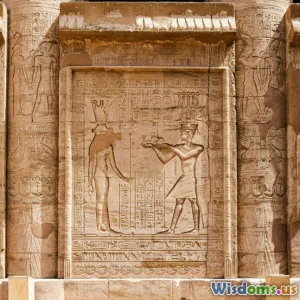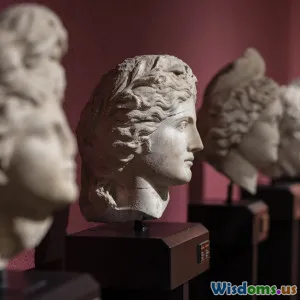
A Guide to Spotting Mythological Influences in Everyday Language
7 min read Explore how mythological tales live on in everyday language, shaping expressions and enriching communication. (0 Reviews)
A Guide to Spotting Mythological Influences in Everyday Language
Language is much more than a communication tool; it is a living archive full of stories, beliefs, and histories that have shaped human culture across millennia. Among these enriching layers lie the echoes of mythology—ancient legends and gods whose stories continue to shape the way we express ideas even today. This guide will help you discover the subtle and not-so-subtle ways mythology permeates everyday language, revealing deeper meanings and cultural connections hidden in common phrases and expressions.
Understanding Mythological Language Influences
Mythology has been foundational in the development of literature, art, religion, and language. Many expressions we use unconsciously are rooted in the myths from Greek, Roman, Norse, Egyptian, and other traditions. These fragments of myth slide into the modern lexicon primarily through idioms, metaphors, place names, and character archetypes.
Why Mythological References Persist
Mythical references endure because they encapsulate universal human experiences—love, heroism, tragedy, and transformation—in vivid narrative forms. Using mythological terms helps convey complex ideas succinctly and powerfully. For example, saying someone has an “Achilles’ heel” instantly conjures vulnerability despite strength, without needing further explanation.
Iconic Mythological Expressions in Daily Language
Achilles’ Heel: Greek Mythology
Originating from the story of Achilles, the Greek hero who was invulnerable except for his heel, this phrase denotes a person's critical vulnerability despite overall strength. It’s commonly used in discussions about weaknesses, in business or personal contexts.
Example: "Their new security system seems foolproof until the Achilles’ heel of outdated software is exploited."
Herculean Task: Greek Mythology
This phrase stems from the incredible strength and the twelve labors of Hercules (Heracles). A Herculean task implies an exceptionally difficult or demanding job requiring great effort.
Example: "Cleaning the entire city park by sunrise was a Herculean task for the volunteers."
Midas Touch: Greek Mythology
King Midas was granted the power to turn everything he touched into gold, symbolizing an uncanny ability to generate wealth or success.
Example: "She has the Midas touch when it comes to managing businesses; under her leadership, profits soar."
Pandora’s Box: Greek Mythology
Pandora’s box refers to a source of endless trouble or complications, rooted in the myth where Pandora opens a forbidden box unleashing evils into the world.
Example: "Starting that investigation opened a Pandora’s box of unforeseen problems."
Between Scylla and Charybdis: Greek Mythology
This phrase means being caught between two equally perilous options, originating from Homer’s Odyssey where sailors had to navigate between two sea monsters.
Example: "The company was stuck between Scylla and Charybdis, having to choose between layoffs or bankruptcy."
Mythological References Beyond Greek and Roman Lore
Ragnarok: Norse Mythology
Ragnarok represents the apocalypse in Norse legends, symbolizing destruction followed by rebirth. It is often used to describe dramatic, large-scale disasters or change.
Example: "The financial crash felt like Ragnarok for the global economy."
Nectar and Ambrosia: Greek Mythology
Described as the food and drink of the gods, symbolizing something supremely delicious or life-giving.
Example: "That chocolate cake was pure ambrosia, truly divine!"
Trojan Horse: Greek Mythology
This refers to a deceptive trick that masks true intentions or dangers, after the Greeks used a wooden horse to infiltrate Troy.
Example: "The app looked harmless but turned out to be a Trojan horse for stealing data."
Recognizing Mythology in Place Names and Symbols
Many place names and common symbols have mythological origins that transmit cultural memories:
- Atlas Mountains and Atlas Shrugged: Atlas was a Titan condemned to hold the sky on his shoulders—symbolizing endurance and burden.
- Venus: The Roman goddess of love and beauty gives her name to the planet and connotes elegance and femininity.
- Olympus: The mythical home of Greek gods represents supreme authority and grandeur, often used for mountain names.
These terms paint vivid pictures, serving as linguistic monuments to ancient narratives.
The Cultural Significance and Educational Value
Recognizing mythological roots in language enriches our grasp of communication. It connects us to a shared human heritage, enhances our understanding of literature, and cultivates critical thinking.
As Joseph Campbell, the famed mythologist, said, "Myth is the secret opening through which the inexhaustible energies of the cosmos pour into human cultural manifestation."
By learning these expressions, writers, speakers, and learners engage more deeply with texts, speeches, and media, unlocking layers of meaning.
Conclusion: The Living Legacy of Myth in Language
The myths of ancient cultures are far from obsolete echoes of the past; they live vibrantly in the words and idioms we use every day. From the “Achilles’ heel” that exposes vulnerability to the “Herculean tasks” demanding extreme effort, these mythological influences enrich communication across cultures and time.
Next time you encounter seemingly ordinary phrases, take a moment to explore their mythological roots. This curiosity not only enhances appreciation for language but also connects you to the timeless narratives shaping human experience.
Embrace mythology as a window into culture, history, and the human psyche embedded in daily speech. To truly master language is to understand the stories it carries.
So, whether you find yourself grappling with a modern dilemma or admiring the literary craft behind an article or novel, spotting mythological influences will open a new dimension of insight and inspiration.
Rate the Post
User Reviews
Popular Posts

















